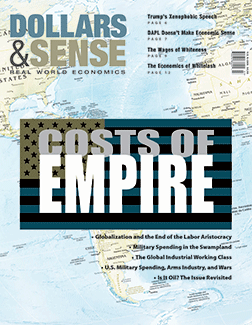
By Jayati Ghosh,
Twenty-first century imperialism has changed its form. In the 19th century and the first half of the 20th century, it was explicitly related to colonial control; in the second half of the 20th century it relied on a combination of geopolitical and economic control deriving also from the clear dominance of the United States as the global hegemon and leader of the capitalist world (dealing with the potential threat from the Communist world). It now relies more and more on an international legal and regulatory architecture—fortified by various multilateral and bilateral agreements—to establish the power of capital over labor. This has involved a “grand bargain,” no less potent for being implicit, between different segments of capital. Capitalist firms in the developing world gained some market access (typically intermediated by multinational capital) and, in return, large capital in highly developed countries got much greater protection and monopoly power, through tighter enforcement of intellectual property rights and greater investment protections.
These measures dramatically increased the bargaining power of capital relative to labor, globally and in every country. In the high-income countries, this eliminated the “labor aristocracy” first theorised by the German Marxist theorist Karl Kautsky in the early 20th century. The concept of the labor aristocracy derived from the idea that the developed capitalist countries, or the “core” of global capitalism, could extract superprofits from impoverished workers in the less developed “periphery.” These surpluses could be used to reward workers in the core, relative to those in the periphery, and thereby achieve greater social and political stability in the core countries. This enabled northern capitalism to look like a win-win economic system for capital and labor (in the United States, labor relations between the late 1940s and the 1970s, for example, were widely termed a “capital-labor accord”). Today, the increased bargaining power of capital and the elimination of the labor aristocracy has delegitimated the capitalist system in the rich countries of the global North.
Increasing inequality, the decline in workers’ incomes, the decline or absence of social protections, the rise of material insecurity, and a growing alienation from government have come to characterise societies in both developed and developing worlds. These sources of grievance have found political expression in a series of unexpected electoral outcomes (including the “Brexit” vote in the UK and the election of Trump in the United States). The decline of the labor aristocracy—really, its near collapse—has massive implications, as it undermines the social contract that made global capitalism so successful in the previous era. It was the very foundation of political stability and social cohesion within advanced capitalist countries, which is now breaking down, and will continue to break down without a drastic restructuring of the social and economic order. The political response to this decline has been expressed primarily in the rise of right-wing, xenophobic, sectarian, and reactionary political tendencies.
Read rest here
